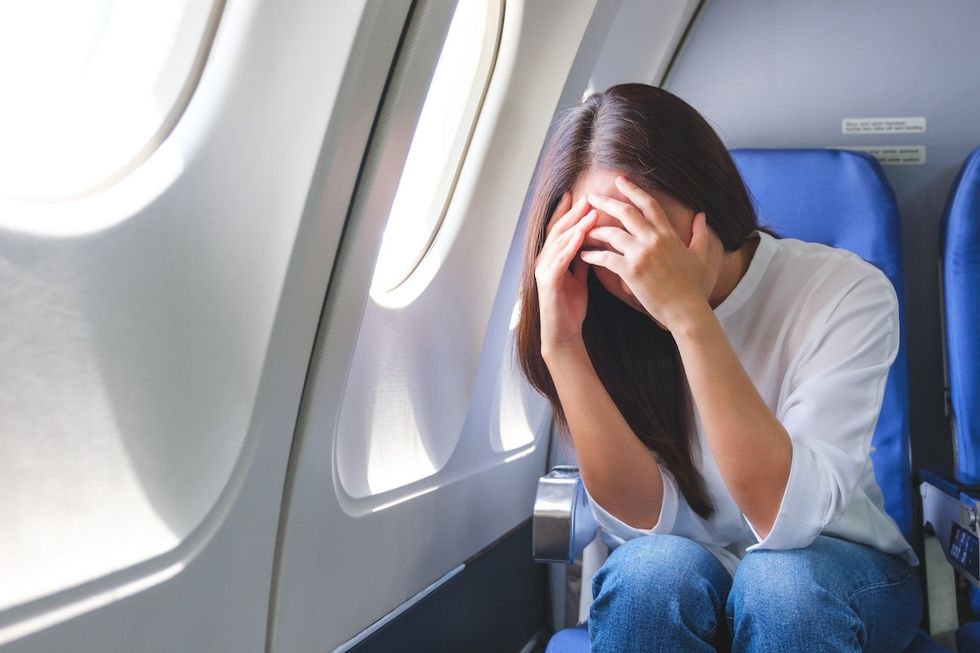A recent air traveler survey from JW Surety Bonds has fueled a new discussion surrounding flight anxiety. According to their results, 48 percent of American travelers said flying commercial airlines causes them anxiety, and 35 percent reported that anxiety holds them back from flying.
Already, an alarming number of aviation incidents have occurred this year. This has, understandably, given travelers pause—and provoked a lot of anxiety around the idea of flying. As a result, travelers have gotten more selective about which air carriers they put their trust in.
RELATED: U.S. Travelers Say This Is the #1 Worst Airline To Fly on Right Now.
Survey data shows that Spirit Airlines is ranked as the most anxiety-inducing airline. In order of most anxiety-inducing, that list goes:
- Spirit Airlines
- Frontier Airlines
- American Airlines
- United Airlines
- Southwest Airlines
- Delta Air Lines
- JetBlue Airways
- Allegiant Air
- Alaska Airlines
- Hawaiian Airlines
Unshockingly, budget airlines Spirit and Frontier ranked as top contenders for inducing anxiety among fliers. Spirit received the most votes (44 percent) from American travelers, earning it first place on the list. Approximately 70 percent of participants said they feel safer booking a ticket through a premium air carrier.
“Overall, men and women felt safest on Delta Air Lines, but women were more likely than men to feel safer on Southwest, JetBlue, and Alaska Airlines,” per the report. However, results also varied by region. Interestingly, Northeasterners feel safer boarding a JetBlue flight, while Westerners prefer to fly Alaska Airlines.
However, naming names doesn’t pinpoint why air travelers feel and experience anxiety. So, analysts dug even deeper to uncover the most common sources of flight anxiety. These answers were grouped into six categories.
- Turbulence (58 percent)
- Safety history (47 percent)
- Service reputation (36 percent)
- Personal experience (30 percent)
- Staff demeanor (19 percent)
- In-flight safety messaging (7 percent)
Additionally, 48 percent of travelers said that “crash-related media coverage influenced their airline choices.” Half of the participants cited crash history, safety concerns, negative media coverage, and bad past experiences for reasons why they “actively avoid premium carriers.” Notably, travelers felt “less likely” to circumvent budget airlines for these same reasons.
Extreme turbulence on an Emirates flight to Dubai left 13 people injured in 2023. In 2024, the Federal Aviation Administration (FAA) opened an investigation following consecutive (yet separate) in-flight emergencies on Southwest flights. Runway collisions have also been of concern as of late. And of course, there was the harrowing plane door incident aboard an Alaska Airlines flight in 2024.
RELATED: Saying These Two Secret Words Will Get You an Instant Airline Upgrade.
Stress, naturally, also fuels flight anxiety. A quarter of respondents consider taking a red-eye flight their “most stressful travel situation.” Nearly 40 percent of respondents said travel anxiety affects their career and/or personal life, with one in 10 having declined a job because of it. The survey’s data also showed:
- 60 percent feel anxious about potential safety concerns, like crashes or accidents.
- 52 percent said having “lack of control over the situation” makes them anxious.
- 38 percent cited delays, cancellations, and logistical issues as stress-inducing.
- 21 percent get anxious about claustrophobia and being in crowded spaces.
- 21 percent said the cost of traveling is too stressful/anxiety-inducing alone.
That said, 52 percent of travelers noted they would not pay extra for a better in-flight experience to help offset their anxiety. Instead, they would add extra time to their itinerary (57 percent); listen to music/podcasts (52 percent); book direct flights to avoid layovers (45 percent); use deep breathing exercises (31 percent); and avoid certain airlines (24 percent) to avoid or manage their anxiety.
“Safety concerns, loss of control, and previous bad experiences all weigh heavily on how people approach travel. From avoiding certain airlines to planning around specific fears, anxiety plays a powerful role in shaping travel behavior,” the report concluded.
Content shared from bestlifeonline.com.

